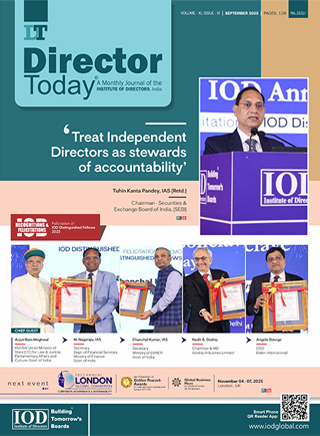The Investor's Ally

The Crucial Role of Independent Directors in Navigating Strategy, Risk, and Investor Relations
Independent directors are on the board because of their expertise in any of the following areas: finance, marketing, technology, operations, and supply chain strategy, with the ability to read and interpret the financial reports of the company. Further, they are expected to have a few other proficiencies, like an overall understanding of the statutory requirements and the ability to bring perspectives overlooked by the promoters and executive directors. IDs should express the same during board meetings without fear or bias and demonstrate exceptional skills for gathering intelligence on business operations and nuances for being effective on the board. First, such skills and characteristics will help anchor the board's functional role as an ID. An ID must be exceptionally good at understanding the linkages of income and expense statements, balance sheet and fund flow statements, and overall business modeling in terms of inputs, processes, and output, and be an effective communicator at all levels. An ID may only communicate a little at levels other than boards, KMPs, and CXOs. This is a traditional view. Certain ID positions require gathering intelligence from different stakeholders, including suppliers, distributors, customers, and the financial community. Only when such intelligence gathering is complete is the effectiveness of an active board improved, either directly or through respective board-constituted committees (specific reference to the audit committee, investment committee, compensation committee, etc.).
The practice of forming effective boards could increase the success rate of startups.
Investor management has been well structured over the decades, especially in the last two decades across the globe, including in India. Such development could be due to responses to a few unfortunate scams that compelled better financial reporting and risk assessments. These required heightened transparency in reporting. Quarter results analysis with the investor community and sharing details about operations planning with risk estimates have become the norm. However, specific questions need to be raised about independent directors' understanding, involvement, and ability to articulate the fineness of such reports and interactions, which are critical to assessing the quality of the board. Naturally, the KMPs are aggressive and forthright in handling such discussions. It is, however, essential to ensure that the IDs participate in such meetings and are knowledgeable about the strategic orientation, risks the company faces, and positioning in the competitive space.
Validating investment strategies: ID's role in mature industries
Showcasing the independent director's strength to the investor community may be necessary. An ID is expected to validate the following to make the role effective: If the business is in a mature industry, the company must earn market returns and ensure that the surplus is adequate to maintain sustenance and provide scope for investors to reinvest in growth opportunities. This is where the advice becomes critical. Is the investable fund channeled into a suitable space, and does the company have the competency or the ability to augment the competency? It is natural for promoters, KMP, CXOs, and probably a few investors to be aggressive about an investment opportunity. IDs on the board are expected to be part of the investment committee and unbiasedly assess the investment opportunity. An independent director can go with the majority and distance himself from the decision. There may be better ways of being committed to the responsibility. It is important to walk that extra mile, which any active and positive boards will welcome, because there is scope to get a contrarian view, which would expose additional facets of risk in business. Many mature companies have benefited from such a positioning. Apart from the contrarian view, it gives two further benefits. The first is avoiding any future guilt of having avoided a decision situation. The other point is that the rest of the board will keep such instances in mind in future decision making to do more deep and structured appraisals. When the investor community gains that confidence, the company gets better market valuation and cheaper access to funds to grow in added portfolios or markets.
An ID must be exceptionally good at understanding the linkages of income and expense statements, balance sheet and fund flow statements, and overall business modeling in terms of inputs, processes, and output, and be an effective communicator at all levels.
Strategic oversight: ID's role in guiding growth-stage companies
The second kind of company that needs understanding is those launching into the industry and business growth. An investor would expect the company to pass the Internal Hurdle Rate (IHR), a rate of return much higher than the market and the industry, and reinvest the same to propel growth on a high track. The role of the independent director, preferably as part of the investment committee, is to ensure timely reinvestment on an appropriate scale and use judicious leveraging of the balance sheet. The management will likely expect the independent director's expertise to dissect the growth opportunity and guide the CXOs with their subject matter expertise. Apart from the active role, the same must be sensitized to the investor committee through active participation in investor relations meetings. The independent directors must judiciously exercise their approach to intelligence to get a little cross-learning and then plug the same into the board meetings. This role could be the most challenging but highly relevant part of corporate governance. Otherwise, the independent directors could be reduced to disconnected decision-making situations benefiting no one. More worrying is that such an approach may lead to the failure of the company to capitalize on the growth track or struggle to manage growth through aggressive decisions, leading to a crash landing for the company. The market has enough examples
Resurrecting success: IDs role in corporate turnarounds
The third area of the independent director's role in corporate governance towards investors and investment management is that of the companies that need resurrection. A revival could be mandated because of market forces, missed opportunities, or failed strategies. There would be pressure on the promoters, KMP and CXOs. The pressure could be intense if it is intensely funded by funding firms. What would the independent directors do towards recovery? Any recovery is possible only when the operating resources and the board quickly recognize the possibility of a fall and rise through specific strategic initiatives. While a few key stakeholders could be defensive about the situation, the independent directors should bring the right approach through organisational soul-searching discussions and get it on track. It is more accessible but challenging. The market has enough examples of failures, and if one dives deep, the lack of communication will cause such a plight. An independent director may feel helpless or have less skin in the game. Investors are going to prefer something else. The most critical area is startups, and the ecosystem requires the considerable involvement of independent directors. Unless it reaches size and becomes mandatory, promoters will likely only bring independent directors onto the board. Potential independent directors are also likely to avoid this, as the rate of success could be higher. However, the system, especially the funders, needs independent directors to help through exceptional postinvestment management skills. The practice of forming effective boards could increase the success rate of startups. Neither the pressure of the funders nor the hubris of the promoters should run such companies. A balanced view of the independent directors who want to build successful opportunities would be the appropriate professionals at this stage.
This applies to stages of acquisitions, mergers, and restructuring of businesses by large corporations. Most of the time, such inorganic moves happen because they give fair returns to investors. Usually, the drive for such moves comes with the need to be aggressive. However, one must see whether the dispassionate independent directors see it as an opportunity. As long as a company establishes such involvement from the board, the investor community will likely be favorably positioned toward the company.
Competency and compliance
Regarding competency involvement, independent directors must look at technology adoption, especially in business processes, financing, and supply chain strategy. The ability to look at the industry's structure, behavior, and performance, especially of the leaders and peers, is critical and facilitates the board's deliberations to benchmark for being within the industry trend.
Last but not least, ID's evaluation of the ability to flag the RPT (beyond compliance). We have enough case studies in both listed and unlisted companies, and the strange coincidence is that the promoters have lost control of those companies.
Conclusion
Independent directors must be conscious of measuring operating risk, which is variability in EBITDA, financial risk measured by leverage benchmarked to the industry, and the portfolio of business risk. The risk committee may consider risk factors and necessary risk management strategies. However, good corporate governance requires understanding these three, and plugging the same into the financial analysis makes long-term sustainable growth and leadership in the industry possible.
Author

Prof. Chandrasekaran N.
He is a Professor, IFMR Graduate School of Business, KREA University, and Independent Director at Take Solutions Ltd.
Owned by: Institute of Directors, India
Disclaimer: The opinions expressed in the articles/ stories are the personal opinions of the author. IOD/ Editor is not responsible for the accuracy, completeness, suitability, or validity of any information in those articles. The information, facts or opinions expressed in the articles/ speeches do not reflect the views of IOD/ Editor and IOD/ Editor does not assume any responsibility or liability for the same.

 Quick Links
Quick Links
 Connect us
Connect us




 Back to Home
Back to Home































